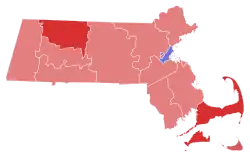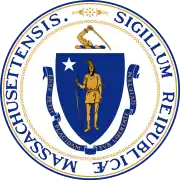1924 United States Senate election in Massachusetts
The United States Senate election of 1924 in Massachusetts was held on November 4, 1924. Incumbent Democratic Senator David I. Walsh, first elected in 1918, ran for a second term in office but was defeated by the Republican nominee incumbent Speaker of the U.S. House Frederick H. Gillett. Despite winning 13 out of 14 counties in the state, Gillett was only able to win a narrow margin of 1.7%, which was largely due to Walsh's strong performance in Suffolk County, home to the state capitol of Boston, likely being carried over by fellow Republican Calvin Coolidge's strong performance in the 1924 United States presidential election.
| |||||||||||||||||
| |||||||||||||||||
 County results Gillett: 50–60% 60–70% 70–80% Walsh: 60–70% | |||||||||||||||||
| |||||||||||||||||
| Elections in Massachusetts |
|---|
 |
|
|
Walsh would later go on to win a special Senate election in 1926 to the Class I seat, and served until his finale defeat in 1946.
Democratic primary
Candidates
- David I. Walsh, incumbent Senator
Results
Senator Walsh was unopposed for renomination.
| Party | Candidate | Votes | % | |
|---|---|---|---|---|
| Democratic | David I. Walsh (incumbent) | 120,915 | 99.99 | |
| Write-in | 8 | 0.01 | ||
| Total votes | 120,923 | 100.00 | ||
Republican primary
Candidates
- Louis A. Coolidge, former Assistant U.S. Treasury Secretary, founding president of Sentinels of the Republic, and former private secretary to Senator Henry Cabot Lodge
- Frederick W. Dallinger, U.S. Representative from Cambridge
- Frederick H. Gillett, Speaker of the United States House of Representatives
Declined
- Channing Cox, Governor of Massachusetts[2]
- Benjamin Loring Young, Speaker of the Massachusetts House of Representatives[3]
Campaign
The early campaign was dominated by President Calvin Coolidge's efforts to recruit a candidate aligned with his own re-election campaign. Louis A. Coolidge (no relation) was the first candidate to formally announce his campaign. He spent much of the early campaign criticizing the President and other national Republicans' efforts to "interfere" in the race.[3] President Coolidge's primary recruit was Governor Channing Cox, who had served as Lieutenant Governor when President Coolidge was Governor of Massachusetts.[3]
Governor Cox announced he was not a candidate in early May, and Speaker of the House Frederick H. Gillett immediately announced his campaign after consulting with President Coolidge's advisor Frank Stearns.[2] At the same time, U.S. Representative Frederick W. Dallinger made his informal campaign formal.[2]
One of the dividing issues in the campaign was Prohibition. Louis Coolidge announced his outright opposition to the Eighteenth Amendment. Dallinger explicitly supported Prohibition. Gillett, who had voted against the Amendment but in favor of the Volstead Act to enforce its provisions, was considered a moderate.[2]
Results
| Party | Candidate | Votes | % | |
|---|---|---|---|---|
| Republican | Frederick H. Gillett | 145,879 | 45.33% | |
| Republican | Louis A. Coolidge | 93,680 | 29.11% | |
| Republican | Frederick W. Dallinger | 82,251 | 25.56% | |
| Write-in | 16 | 0.01% | ||
| Total votes | 321,826 | 100.00 | ||
General election
Candidates
- Frederick H. Gillett, Speaker of the United States House of Representatives (Republican)
- Antoinette F. Konikow, physician and feminist activist (Workers')
- David I. Walsh, incumbent Senator since 1919 (Democratic)
Results
| Party | Candidate | Votes | % | ±% | |
|---|---|---|---|---|---|
| Republican | Frederick H. Gillett | 566,188 | 50.26% | ||
| Democratic | David I. Walsh (incumbent) | 547,600 | 48.61% | ||
| Workers | Antoinette F. Konikow | 12,716 | 1.13% | N/A | |
| Total votes | 1,126,504 | 100.00% | |||
References
- Office of the Secretary of Commonwealth of Massachusetts (1924). Number of assessed polls, registered voters and persons who voted in each voting precinct in the Commonwealth of Massachusetts at the state, city and town elections.
- "Gov. Cox' Refusal Puts Mr. Gillett Into Senate Race". The Christian Science Monitor. May 9, 1924. p. 1.
- Merrill, John D. (May 7, 1924). "COX STANDS FIRM, BUT BUTLER IS HOPEFUL". Boston Daily Globe. p. 1.
- Office of the Secretary of Commonwealth of Massachusetts (1924). Number of assessed polls, registered voters and persons who voted in each voting precinct in the Commonwealth of Massachusetts at the state, city and town elections.
- "Our Campaigns - MA US Senate Race - Nov 04, 1924".
.jpg.webp)
.jpg.webp)